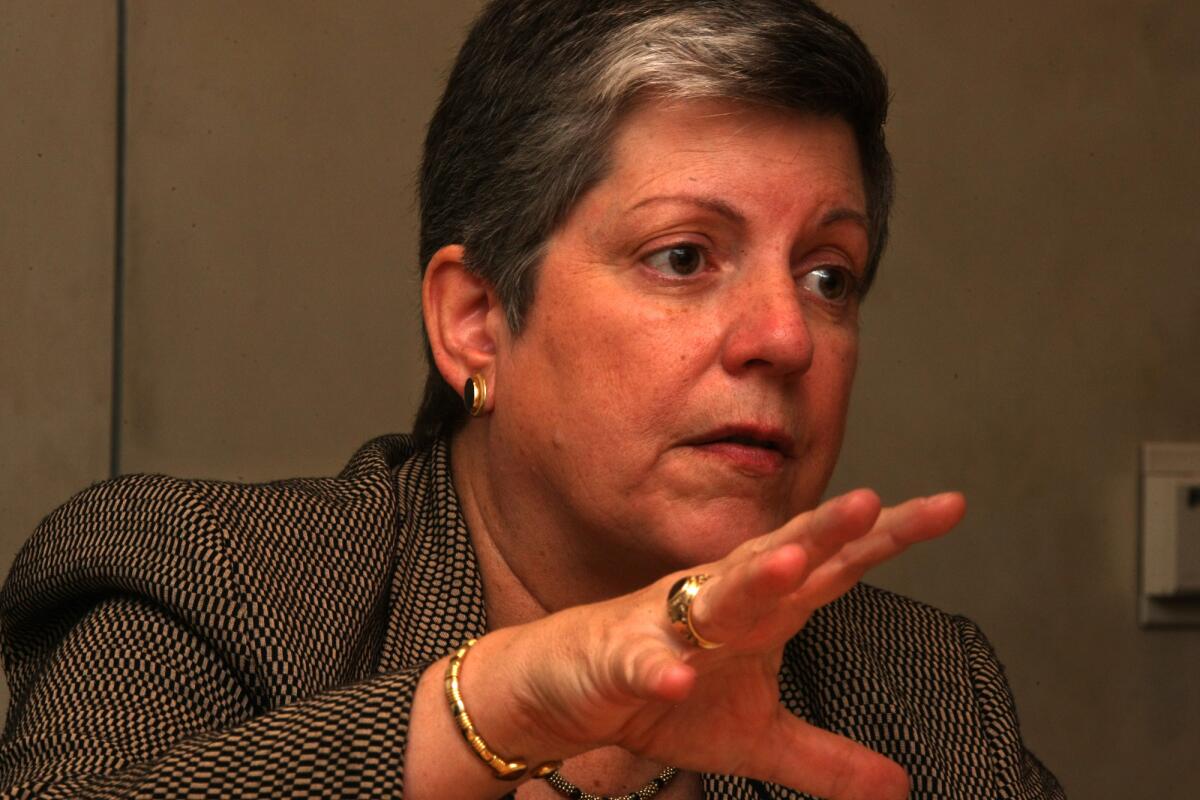University of California launches effort to reduce world hunger

- Share via
The University of California system is launching an effort to expand research and outreach to help reduce world hunger, improve nutrition and aid farmers coping with climate change, officials announced Tuesday.
UC President Janet Napolitano said the system’s 10 campuses, its large agricultural programs and the Lawrence Berkeley National Lab that UC manages will participate in the new University of California Global Food Initiative.
“It’s an example of how a great research university can take on one of the world’s great problems,” Napolitano said in an interview.
Building on already strong UC research on topics such as soils, citrus fruit and water purity, the effort will work “toward putting the world on a path to sustainably and nutritiously feed itself,” according to a UC announcement.
Many of the details remain to be worked out, but UC campuses are expected to take lead roles in one or more of the topics, depending on the expertise of their faculty and the interests and needs of their communities. Among other things, the UC president’s office will fund three $2,500 student fellowships on each campus for undergraduates or graduate students to work on research or related internships.
Through faculty work on worldwide issues of climate and crop yields, UC aims to improve its internal policies on feeding its own students and staff, Napolitano said. Campuses are supposed to boost collective purchasing power to encourage sustainable farming practices, expand practices to reduce food waste and add more gardens, food pantries and farmers markets. Meanwhile, food issues are expected to become part of more UC courses, she said.
Napolitano, the former U.S. secretary of Homeland Security in the Obama administration, said she recently discussed the initiative with Agriculture Secretary Tom Vilsack and came away with the sense that federal research funds in farm-related appropriations might help support UC efforts.
“I think we are in a good competitive position,” she said of applying for those funds. She said she did not think the new programs would add significant costs to UC’s own budget.
Napolitano unveiled the program Tuesday at the Martin Luther King Jr. Middle School in Berkeley, where students grow and cook organic food as part of the Edible Schoolyard project. She was joined by Alice Waters, founder of the Edible Schoolyard project and owner of the famed Chez Panisse restaurant in Berkeley.
Later in the day, Napolitano presented details to a Sacramento meeting of the state Board of Food and Agriculture and visited a student-run garden at UCLA’s Sunset Canyon Recreation Center.
“We can all step back and agree, for instance, that healthy food is better than unhealthy food. We can all agree that a world in which a billion people go to bed hungry each and every night is morally unacceptable. And we can all agree that we need to steward our resources, our land and our water — with agricultural and consumption practices that ensure these essential resources will be there not just for this generation, but for generations and generations to come,” Napolitano said at the Berkeley event.
Twitter: @larrygordonlat
More to Read
Eat your way across L.A.
Get our weekly Tasting Notes newsletter for reviews, news and more.
You may occasionally receive promotional content from the Los Angeles Times.










